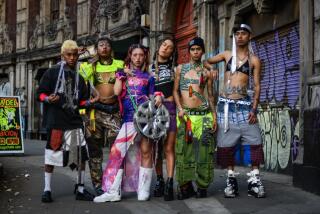Everything’s Coming Up Daisy : MTV Host Fuentes Is a Hit in Two Worlds--Television and Modeling
- Share via
In Los Angeles, she looks for acting roles; in New York, it’s modeling gigs. But Daisy Fuentes, the sunny Latina-next-door who regularly hosts “MTV Internacional” and can be seen this week in the “Best of Beach MTV,” never sought an audition for the combined job of role model.
“I keep hearing that word,” Fuentes, 26, said during a recent stop in Los Angeles. “At first it was a little scary, ‘cause I never asked for this responsibility--and it is a big responsibility when little girls come up to you and say, ‘You’re kind of my role model.’ But the more I thought about it, the way I live my life, there’s really nothing to worry about.”
The way she runs her career, though, provides room for speculation. Whither the highly exposed video jockey? In MTV’s infancy, the veejays were a mix of seasoned radio personalities and vapid card readers; show-biz wags even claimed they were chosen to be as bland and colorless as possible so they couldn’t use the fledgling network as a professional launching pad.
Now, relatively speaking, the veejays are funnier, sharper and more attractive. And several, including Pauly Shore, Dan Cortese, Dr. Dre and Ed Lover, have parlayed their exposure into movie, TV and ad deals.
Fuentes has gotten into the spinoff act with a contract for Revlon that, so far, has entailed a memorable campaign in which she joined an array of supermodels, including Cindy Crawford and Claudia Schiffer, in some coy sparring with Sugar Ray Leonard.
Amazingly, despite the company and the contract, she doesn’t consider herself a model and, indeed, has no modeling agent (she’s handled by a talent agent).
“I’ve never been hired because I’m beautiful--it’s just lucky that way,” Fuentes said. “If Revlon had wanted just a pretty chick, why didn’t they just hire one of the other supermodels that already exists? I’m not a model; they saw me on MTV, so they must have liked something I said, because MTV’s not about looking glamorous or beautiful.”
What? The network that bursts with sleek decolletage, the electronic platform from which stars like Madonna turned the music industry into an image industry?
“Oh, yeah, I think Beavis and Butt-head definitely have a glamorous side,” she joked, invoking the network’s flip side. Fuentes, however, is less a part MTV’s grungy id than its glossy, multicultural superego. Says “Beach MTV” segment producer Danika Kvslovic, “You see her as the fun, girl-next-door type you want to sit down and hang out with.”
This appeal has extended across the cultural divide that Fuentes, who was born in Cuba and raised in New Jersey, herself straddles. She intends to continue dividing her attention between Spanish- and English-language markets--including a new, all-Spanish network, “MTV Latino,” which will premiere in the United States and Latin America in October--and refuses to see her career at the familiar crossroads of crossover.
Her world, she said, is “split exactly 50-50 down the middle. It’s the same personality, different language.”
Ironically, the light-brown Latina look that may have eased her into the image mainstream is creating problems in casting calls.
“For example, the character description will say, ‘Young, good-looking Latin-American woman,’ ” she said. “I show up, and the response is, ‘Well, you know, she was good, and she’s really pretty, but she’s just not Latin enough.’
“Then I read for an Anglo part, and it’s, ‘Well, you know, “Fuentes,” she is a Latina.’ My feeling is, God, can’t we get past this?”
Her parents left Cuba in 1969, lived in Spain for a while, then moved to the United States. “I Love Lucy” was in reruns, but it had impact on Fuentes, who recalls the depiction of Ricky Ricardo, and by extension Latino culture, as “glamorous, successful.”
“Now we just get dumped on,” she said. “Even Latino comics just tell jokes about gangbangers. I’m the first person to appreciate humor, but it’s getting tired. . . .
“The way I was brought up, as far as other Hispanic nationalities go, is that the one thing we have in common is that we’re all struggling in a country that is not ours. Sure, if we were living happily in Cuba and someone came over from Mexico, we might be, ‘This is our country, you’re a foreigner.’
“But here there are no foreigners--we’re immigrants, they’re immigrants, and we’re all Americans.”
More to Read
The complete guide to home viewing
Get Screen Gab for everything about the TV shows and streaming movies everyone’s talking about.
You may occasionally receive promotional content from the Los Angeles Times.






